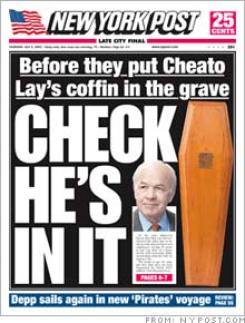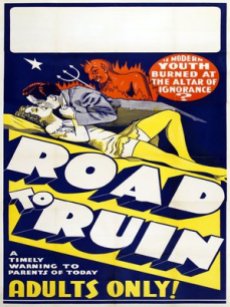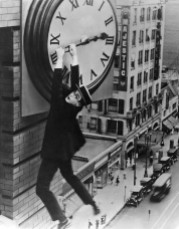
At loose ends–well, he was always at loose ends these days–Hall went over to the treadmill, set it at a very leisurely pace indeed, far more languid than Flip would ever allow, and went for a little walk.
A little walk to nowhere, that’s what his life had come down to. He could walk, he could walk all he wanted, but he couldn’t actually go anywhere.
Treadmill to Oblivion, 1954, Fred Allen’s grim-titled memoir of his life writing and starring in a weekly radio show. Hall had a copy of it, of course, signed first edition with a dustjacket in almost perfect condition. He’d been told it was a very good book.
He didn’t need to read those books. He didn’t need to exercise on all these intimidating machines. He didn’t need to drive all these cars. He needed to have them, that’s all, have everything, have the complete set of everything ever made. Then he’d be happy.
Dortmunder was never happy outside the five boroughs. There was always something wrong with the rest of the world, some way it had figured out to make him more uncomfortable. For instance, in the uncharted middle of Pennsylvania, he had to sleep on the kitchen floor.
Anne Marie said, “I remember that! Wasn’t he the white-haired man that testified in front of congress?”
“Anne Marie,” Andy said, “every white-haired man in America that owns a suit has testified in front of congress.”
Before we start on this one, let me lay out the rest of the program for this revue of reviews that is now approaching its end. There is nothing left to cover now but three Parker novels, four Dortmunder novels, ten Dortmunder stories (plus one alternate universe Dortmunder story), one Dortmunder novella, and Forever And A Death, which I’m not reviewing until it’s been available to the general public for a month or two.
When all of that is done, I may well find other things to talk about, but the primary mission statement of this blog will have been completed, much to my own amazement, since I never finish anything I start, unless it’s a glass of beer, or a crossword puzzle (I cheat). First time for everything, I suppose, but we’re not there yet.
The three linked novels that inconclusively conclude the Parker saga stand out starkly from the rest of the work he did over the last five years of his life. I want to review them as a set, so even though Nobody Runs Forever came out the same year as this book, I’m going to put it off until I’ve reviewed all the Dortmunders other than the last one, which I believe was written with the idea it would be the last.
By the time I’m through all that, it’ll be time to give Forever And A Death the detailed scrutiny I have no reason to think any professional critic will have given it. Then the final three Parker novels, one after the other. My one-part reviews of Dirty Money and Get Real will be published within less than a minute of each other, because I don’t want to show favoritism. We clear? Let’s get this show on the road. To ruin, naturally.
This is yet another book in which Dortmunder comes into conflict with a very rich and narcissistic man, though one who has already suffered his comeuppance. One might start to come to the conclusion that Westlake didn’t care for the very wealthy. Though he spent so much time writing about them, one cannot deny there was a certain fascination there–what’s it like to have so much more in the way of material resources than anyone could possibly need? What does that do to your sense of self?
Westlake seems to believe that too often it distorts, disengages, and ultimately destroys your sense of self. But first it magnifies your sense of self-importance to absurd, almost Swiftian extremes. Which can lead in its turn to rather edifying downfalls. And the rest of us, torn between admiring, envying and disparaging the very wealthy, while being all too aware of the low regard they hold us in, can perhaps be forgiven for rejoicing in the fall of titans, who turned out to be not so big after all.
What’s The Worst That Could Happen? was the first of the Dortmunder novels where the tantrum-prone tycoon had some identifiable models in real life. Most notably the one who somehow got into the White House, and refuses to leave now (best check his pockets for silverware when he does, and maybe the launch codes). But that character was a composite, and Westlake pretty carefully avoided getting too obvious about it, because his primary model was well known for his thin skin, and love of litigation.
As matters worked out, however, no lawsuits were filed (to notice you’ve been lampooned in a book requires that you occasionally read books), and Westlake may have felt emboldened when it came to choosing his next victim. Or rather, victims–another composite composed of figures ripped from the headlines, but all from the same company this time. Most notably, people like Kenneth Lay, Jeff Skilling, and the lesser known Andrew Fastow, and his wife, Lea. You know. Enron. We still remember Enron, right? A decade feels like an eon, nowadays. You can bet there are still millions of people struggling through unexpectedly sparse retirements who remember them vividly. And all the horrible yet richly deserved puns on the first guy’s name.
(With all due respect to Murdoch’s rag, this looks like a job for the Weekly Galaxy.)
Again, it’s not meant to be a direct portrait, but rather an extrapolation based on reading the news stories, the interviews, and imagining what such a creature might be like, what his life would be after his public disgrace, what stories might potentially be told about him; positing that he avoids prison while staying alive, something none of the Enron guys ultimately managed to do. Which kind of undermines the premise, but what the hell. A writer of satiric fiction, moved by current events, must nonetheless create his own characters, with their own unique fates. And Westlake, writing this not long after the scandal broke, couldn’t wait for the courts to get around to sentencing these guys. He couldn’t be sure he’d live that long. Satirists are not required to be fair and balanced (neither are cable news channels).
And fairness is wasted on some people, if we’re going to be balanced about it. It’s wasted because they have rejected the very concept of fairness, or compassion, except for themselves. By degree they become isolated, not merely from the lower orders of society, but from society itself. Narcissism devolves into solipsism, the black hole of identity. That’s going to be one of the points of this book. That a pitiable character is not the same thing as a sympathetic one. But as always with a Dortmunder, the main point is to make us laugh–the better to keep us from crying over our lost pensions and portfolios, and the general unfairness of Life.
And who knows more about Life’s injustice than Our Hero, who we rejoin now, as he ponders the mysteries of local media.
Dortmunder sat in his living room to watch the local evening news, and had just about come to the conclusion that every multiple-dwelling residence in the state of New Jersey would eventually burn to the ground, three per news cycle, when the doorbell rang. He looked up, surprised, not expecting anybody, and then became doubly surprised when he realized it had not been the familiar blatt of the hall doorbell right upstairs here, but the never-heard ing of the street-level bell, sounding in the kitchen.
Rising, he left the living room and stepped out to the hall, to see May looking down at him from the kitchen, her hands full of today’s gleanings from her job at Safeway as she said, “Who is it?”
“Not this bell,” he told her, jabbing a thumb over his shoulder at the hall door. “The street bell.”
“The street bell?”
Dortmunder clomped back to the kitchen, to the intercom on the wall there that had never worked, that the landlord had just repaired in a blatant ploy to raise the rent. Not sure of the etiquette or operation of this piece of machinery, for so long on the inactive list, he leaned his lips closer to the mouthpiece and said, “Yar?”
“It’s Andy,” said a voice that sounded like Andy being imitated by a talking car.
“Andy?”
May said “Let him in, John.”
“Oh, yeah.” Dortmunder pressed the white bone button, and yet another unpleasant sound bounced around the kitchen.
(You will never know the restraint I had to employ to stop myself from typing out the entire first chapter of this book, which is probably illegal, but then so is most of what happens in the book, so there. Our landlord, parenthetically, years ago replaced our old apartment number based intercom with one that requires visitors to punch in a secret code that rings the bell, and then you have only about twenty seconds to get to the button and buzz them in, before everybody has to start all over again. Richer buildings in my nabe, by contrast, have security cameras at street level, little TV monitors up above, and you can look your would-be visitors in the face and tell them you don’t want to see them, even though you are, in fact, seeing them. Think of all the fun Westlake could have had with that.)
There’s no pleasing that old grouch Dortmunder. Normally Kelp never announces his impending presence, merely picks the locks and lets himself in, but this time he thought he’d respect their privacy by making them listen to New Music. Anyway, Andy just wants to know if Dortmunder has a pending job he can horn in on, and if not, he’s got an idea about robbing the Speedshop big box store in New Jersey, where Dortmunder nearly got nabbed by the cops in the last book. Dortmunder takes a pass on that.
Then the phone rings, Kelp starts in on his usual spiel about how he could put in all kinds of extensions, Dortmunder just has to say the word, and Dortmunder responds with his favorite word, which is no. Then May comes back from the phone, and says it’s Anne Marie for Andy. She wants him to know there’s this man sitting in their living room who says he’s an old friend, and he won’t leave, and he won’t give his name, and would Andy please come home now? And then Dortmunder realizes he’s expected to go too. And this is what comes of modern communications technology; intercoms, landlines, etc. Well, that’s what Dortmunder thinks of as modern communications technology. Please, nobody tell him about Twitter. Though probably Kelp already has.
I can be grouchy too, and I have many problems with the final run of Dortmunders, but Westlake’s talent for observational humor never once flagged, to the very end. He drags you in with the first paragraph, and you’re hooked. But hooked to what, pray tell? The ideas being used here would work fine for a short story, or even a short novel. Thing is, most of the final Dortmunders run long. The market wanted them long, to justify that intimidating price on the inner dust jacket.
If there’s anything harder than writing comedies, it’s writing long comedies, with elaborate premises. This premise is decidedly elaborate. The book is a lot better than I remembered–still a rambling, somewhat disjointed, and not entirely satisfying escapade, due partly to its excessive length and complexity. And the same could be said of many a Dickens novel, to be sure. But Dickens has tenure. Westlake’s is still hung up in committee. Anyway, what’s the premise here?
The guy waiting in Andy and Anne Marie’s apartment out to be an old friend of Andy’s, named Chester Fallon He wouldn’t ID himself to Anne Marie, because for all he knows she’s the law, he’s seen cops as pretty as her, to which Dortmunder replies “Not enough of them,” so he does notice things like that. Anne Marie is mainly irritated that he wouldn’t even give his first name–would have saved her a lot of worry, since nobody was ever scared of a guy named Chester.
Chester was a stunt driver in Hollywood, back before Hollywood replaced most stunt drivers and their deathproof cars with computer generated imagery. Having become redundant in one career, he made use of his skills to drive getaway cars for heisters, which landed him in stir for a while. Getting out early on good behavior, he landed a dream job as chauffeur for Monroe Hall, a mega-rich corporate executive, who owned a large assortment of rare and nifty old autos, worth about two million dollars on the collector’s market. Aside from driving Hall and his wife, Chester was expected to tool around in all these cars regularly, to keep them in good working condition. Great salary, great benefits, great rides–what’s not to like?
This. Hall’s company was called Somnitech. Note the past tense. Somnitech dealt in energy, communications, manufacturing, etc–“It’s what they call horizontal diversification, which to me sounds like a whorehouse that caters to all tastes, but if that’s what they want to call it, fine.” Somnitech paid Chester’s salary, benefits, retirement plan–it paid for basically everything and everybody Hall needed or wanted in his personal life, which was not 100% kosher, but he and others at the top of the Somnitech food chain did it anyway.
And they got caught. The company’s stock collapsed, and due to its very large size, this had a very bad effect on the personal fortunes of people from all different walks of life. Calls of “Lock the rascals up!” were heard throughout the land, but they were not locked up. Their lawyers saw to that.
They did have to make restitution, however, and although Monroe Hall remains fabulously wealthy, most of his funds are tucked away safely in offshore accounts where no greedy government or choleric creditor can lay covetous hands upon them. How he spends his stateside cash is tightly controlled. His cars are now the property of a museum in Florida, but the terms of the donation say he can have the use of them while he’s still alive, so they’re still on his estate in Pennsylvania.
And he can’t consort with known criminals, being one himself now (which seems a bit perverse), so guess who’s fired? Chester hadn’t gotten so much as a parking ticket since his release, but he still lost his salary, benefits, retirement plan, and the little house on Hall’s estate he and his wife Grace were living in. Hall did something literally millions of times worse than Chester ever did, and his punishment is to live like a rich man with his beautiful blonde wife in a well-appointed mansion on a lovely little piece of land that takes up most of the county it’s in. I feel like Anatole France should have lived to comment on this, but I suppose he did in his way. “La majestueuse égalité des lois…”
So everybody present is saddened to hear about Chester’s misfortune, but what does he want them to do about it? Clearly something unlawful, because that’s the only thing people ever ask them to do. John cuts to the heart of it–“What is it you want to steal?” “His fucking cars,” Chester said, and nodded at Anne Marie. “Excuse the French.”
(Sidebar: Not for the first or last time, Westlake’s often uncanny penchant for prognostication plays him false here. Let it not be said life never improves on fiction. Within a short time of this book being published, the central figures in the Enron debacle had been imprisoned, with the exception of Lay, who died shortly before that could happen.
Not even moats filled with man-eating lawyers, as Chester puts it, were able to protect them from the raucous public outcry for their incarceration that came–and this is key–from all segments of society. If they’d only screwed over the hoi polloi, they’d have probably gotten a deal somewhat like Hall’s. But a large segment of the gentry lost their shirts on Enron too. And that’s the moral of the story, kids. As Bernie Madoff could tell you.
Westlake does make it clear, later in the book, that it wasn’t only working stiffs who nursed a grudge, but he underestimated how the rules can change when you screw over the patricians along with the plebes. Or, having seen boobs like Trump avoid justice so long, he figured any rich prick could do it. Or maybe he just needed to keep Monroe Hall out of prison for the purposes of the story–and had his own unique form of punishment in mind. There was much of W.S. Gilbert’s Mikado in Mr. Westlake, I often think.
Anyway, we can nitpick all we want, but Fastow only did a year. Skilling gets out in 2018 [they lopped ten years off his sentence], and can look forward to a very comfortable retirement in an America he oddly helped to bring about. Want to see the dank stygian hellhole they stuck him in?

Montgomery Federal Prison Camp. Considered by many to be one of the four best lock-ups in the country to stay at, if you’re shopping around. “La majestueuse égalité des lois…” Excuse the French.)
Chapter 3 takes us over to Pennsylvania, to Monroe Hall, and his lovely wife Alicia, who we’re told loves the bum, but not without certain reservations. She also worked at Somnitech, had a fair bit of culpability in its misdeeds, and being maybe the only person Hall gives half a shit about, he’d protected her. So now she feels she has to share in what amounts to his house arrest, since he doesn’t dare go outside the grounds, for fear of encountering some among the very large number of people who want to do him bodily harm (there is reputedly one fellow toting a horsewhip in happy anticipation of the day he lays eyes on Mr. Hall).
He wants to throw a big party for all their friends. She informs him sadly he doesn’t have any friends now. Most of their former social circle will never forgive him for fleecing them. He and his fellow conspirators at Somnitech are expressly forbidden to see each other. She says they should all feel very lucky they’re not in prison. He sulks that he might as well be. She suggests he is perhaps feeling a little sorry for himself, and says they can go for a drive. He doesn’t want to. She says she’s going for a drive anyway. In the Healey-Silverstone. One of her favorites in Monroe’s collection. If you want to see why–

(She looks good in it, we’re told. “With the beautiful long-haired blonde at the wheel, flashing through the lush green Pennsylvania countryside on the first day of June, it was a sight to make you glad there’s evolution.”)
Chapter 4 is Dortmunder walking into the O.J. Bar & Grill, where the regulars are discussing global warming, air conditioners, and why all the holidays are on Monday except Christmas and Thanksgiving. Rollo the bartender has a new electronic cash register, the functioning of which he explains to a skeptical Dortmunder, while the regulars begin pondering the weighty question of whatever happened to Armistice Day. If you are a reader of these books, you are experiencing a warm inner glow right now, just thinking about it.
Dortmunder takes the usual array of beverages back to the back room, which he’s happy to see he’s the first to arrive at, so he can sit facing the door (no doubt thinking of poor Mr. Hickok). Murch arrives, later than he’d hoped, complaining about bicycle lanes on the BQE, and monorails on the Van Wyck (there are not, to this day, any monorails in the five boroughs, unless you count the one in the Bronx Zoo, but the word ‘monorail’ is just inherently funny, ask The Simpsons).
Kelp and Chester arrive, while Tiny lingers behind at the bar a short time, to explain to the regulars that he really does not care whether we ever celebrated Decoration Day in America. The regulars should have learned by now not to confuse Tiny Bulcher, but maybe this is a new set of regulars, to replace past sets he was forced to chastise. Chester looks at the Kong-like hand Tiny proffers to him, the knuckles damp, and asks if Tiny hurt himself. “I don’t hurt myself,” is the rejoinder.
So Chester tells his story again, and Tiny expresses the opinion that this Monroe Hall person could do with a little chastisement, and at this point the reader is of the opinion that the world could use a lot more Tiny Bulchers in it. Like one stationed right outside Mar-a-Lago would be good.
Basically, the idea is that they steal the six most valuable cars, and maybe pack them with a lot of smaller collectibles, like music boxes and cuckoo clocks, that Hall accumulates to himself like the world’s richest and least lovable pack rat. But this rat has a large security staff (larger than ever, now that the whole country wants to dismember him), and is surrounded by an electrified fence that is also alarmed, so that if the current is broken, the rent-a-cops come running. So everybody looks at Dortmunder, like they always do when they need a plan to get in somewhere they’re not supposed to be and come back out again. And he says they need to go see the place.
So then we meet Mac, Buddy, and Ace, three stout-hearted union members (not stout in heart only), parked outside the Hall estate, singing their union anthem:
“Who will always guide the way?
Give us comfort in the fray?
Gain us benefits and pay?
The A C W F F A!”
If you were wondering whatever happened to the American labor movement……well, let’s say it’s come a long way since Killy, and probably the wrong way.
They follow Alicia around the countryside, as they have done many times before, which is at least aesthetically pleasing, but brings them no closer to their goal of getting their hands on her husband, who screwed over them and their union siblings something fierce. But in this instance, it brings them allies–of a sort. Remember what I said about how it wasn’t only the working class who have bones to pick with Monroe Hall?
These two gentlemen sidle up in their leased Lincoln Navigator, “the most carnivorous vehicle on the road, the Minotaur of motoring.” As thin and natty as their bluecollar counterparts are pudgy and disheveled, they go by the names Mark Sterling and Osbourne Faulk. Venture capitalists. Relative small fry in the seas of commerce, but with the ambition of someday becoming full-fledged sharks. Or rather, that was their ambition, before the blandishments of Monroe Hall & Co. induced them to invest heavily in Somnitech stock. Uh-oh. Every time Mark brings up what followed this investment, Osbourne (‘Os’ to his friends, Mister Os to his enemies), growls softly.
Buddy says they can relate–they lost everything too.
Surprised, Mark said, “You invested?”
“Everything,” Buddy told him. “Life insurance. Health insurance. Pension plan.”
Oh, those things. They hardly mattered in the grand scheme of existence, after all, but Mark could just see that Buddy and his friends might treasure them more than they were really worth. Symbolic value, and so on. Sympathy at full bore, he said, “So you see, we are in a similar situation.”
As the scorpion once said to the frog. But Mark does have some valid points to make here–the three amigos don’t really have a workable plan. They think if they can capture Monroe Hall, they can hold him for ransom, ten million dollars, to be distributed equally to all of their members–a bit over 3k apiece. As Mark thought–symbolic value. Though in his own cold way, he does find their altruism moving, if naive.
He lets them down gently–even if they could get Hall, even if Alicia agreed to pay, as she probably would (none of them believes Hall would pay ransom for her, or his own mother, were she unfortunate enough to be among the living now)–as soon as the money got stateside, the Feds would siphon it up.
No, the thing to do is to get Hall in their clutches, and then, fixed beneath the baleful gaze of Mister Os, who keeps saying things along the lines of “With our hands upon his throat,” they can gently persuade him to transfer the needed funds–ten million for the union, millions more for Mark and Os to invest in a new business opportunity they believe will proceed more felicitously–from his numbered overseas bank accounts, via their laptop. Do it all electronically. Don’t bother with such a greasy fungible as mere cash. He doesn’t mention bitcoin, but how much you want to bet he would have had this book had come out a few years later?
So the bargain is struck. They will work together as a team, and since they have mutually concluded Hall is never coming out, they will have to figure out a way to go in and get him.
And now we’re with Andy Kelp, called upon to provide a car for the gang to head over to Pennsylvania in, and still imbued with a deep faith in doctors–not their medical expertise so much as their good taste in cars, and he is pleased to have his faith borne out once more, as he finds a Buick Roadmaster Estate station wagon, circa the Mid-90’s, complete with MD plates. Seats nine, or in this instance, four plus Tiny.
This grand vehicle was a color not seen in nature, nor much of anywhere else except certain products of Detroit. It was a metallic shimmering kind of not-chartreuse, not-gold, not-silver, not-mauve, with just a hint of not-maroon. It was in effect a rendering in enamel of a restaurant’s wine list descriptions. But even better, from Kelp’s point of view, the Roadmaster was dust-free.

As one auto-centric website describes it, “The last of its kind. An end of an era. The final chapter.” In short, the ideal transport for the Dortmunder gang. But far from ideal for Dortmunder, who ends up sitting in the auxiliary seat in the far back, that you have to enter via the tailgate, and which faces the rear of the vehicle, meaning that he has to put up with all kinds of disrespectful gestures from passing motorists and their bratty kids. He bears it with his usual stalwart dignity and forebearance. Tiny suggests they get some carpet tacks to fling under the tires of the offending motorists. Dortmunder is grateful for the suggestion.
So they size up the security at the estate. If only Somnitech had been this secure. Dortmunder quickly figures out there’s no way they can break in there undetected and get the goods out. So it’s no go? Not quite.
They had a lot of time to gab on the way there and while sizing up the terrain, and Chester has understandably had a lot to say about his former employer–and he lets it slip that nobody really wants to work for the guy anymore. He’s pitifully understaffed. And here is the point of vulnerability Dortmunder’s practiced eye always looks for. “Monroe Hall needs staff,” Dortmunder said. “We hire on.”
So he declares at the end of Chapter 9, and now the premise of the book is is fully established. Dortmunder & Co. will pretend to be the faithful employees of a faithless billionaire. The union guys and the baby capitalists will pretend to be on the same side. Monroe Hall will pretend to be a human being and Alicia will go on pretending to believe that he is one. The ducks are lined up. The stage is set. The cast is assembled. Part 1 is concluded.
Which leaves a whole lot of book left for Part 2. Not quite four fifths of the book, to be precise. But that four fifths includes a whole lot of extraneous material we can skirt past, which is the primary weakness of this novel–and at the same time, one of its undeniable pleasures. As I like to say, reading the late Dortmunders is a bit like hanging out and chewing the fat with old friends. It may not always be as productive or enlightening as one might hope. But if there’s a more pleasant method for frittering away one’s spare time betwixt the cradle and the grave, I’ve yet to find it.
PS: The title of this book had been used several times before–in several different genres and artistic medias.
So which of these might have inspired the erudite Mr. Westlake to choose that title? I’m guessing the first. But hell, let’s say all of them. Why not? It’s the road we’re all on, after all. These gents will vouch for that.
(Part of Friday’s Forgotten Books)
































